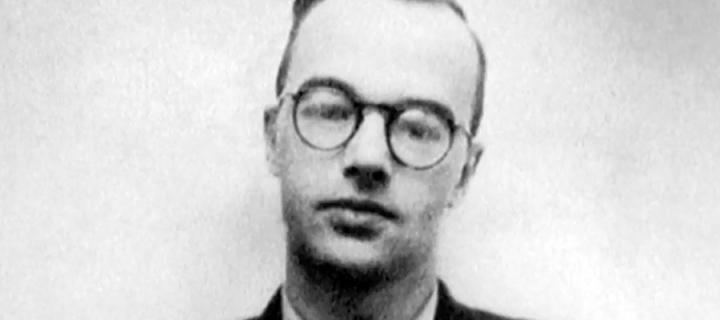Klaus Fuchs (1911 – 1988)
German-born physicist and spy who was arrested and convicted for giving vital atomic-research secrets to the Soviet Union.

Emil Julius Klaus Fuchs was born into a Lutheran family on December 29, 1911 in Rüsselsheim, Germany. Fuchs studied physics and mathematics at the University of Leipzig, where his father was a professor of theology, and became involved in student politics, joining first the Social Democratic Party of Germany (SPD) and then, in 1932, the Communist Party of Germany (KPD) after he had been expelled from the SPD.
Brilliant young scientist
Due to his political leanings, he was forced to flee Germany after the Nazis came to power in 1933, and ended up in Great Britain. Klaus was a brilliant young scientist and soon found his way back into academia; studying first for his PhD at the University of Bristol under the supervision of Nevill Mott, and then at the University of Edinburgh where he studied for his DSc and worked as an assistant to Max Born.
Wartime research
After the Second World War broke out, he was briefly interned as a German on on the Isle of Man and in in a camp in Quebec, Canada but after an intervention by Max Born he was brought back to the UK and worked as an assistant to Rudolf Peierls, on "Tube Alloys"—the British atomic bomb project. In 1942 he became a British citizen.
In 1943, Fuchs and Peierls went to Columbia University, in New York City, to work on the Manhattan Project, the US led research and development project that produced the first nuclear weapons during World War II.
Fuchs then joined the Theoretical Physics Division at the Los Alamos Laboratory, working under Hans Bethe, the German and American nuclear physicist. It was at Los Alamos where he acquired a thorough knowledge of the theory and design of the atomic bomb.
Soviet ciphers
After the war Klaus Fuchs returned to the UK and worked at the Atomic Energy Research Establishment at Harwell as head of the Theoretical Physics Division. It was at Harwell that he was confronted by intelligence officers who had information regarding Fuchs’ activities during the war unearthed by the Venona project, a counter-intelligence program that identified Fuchs under his code names of CHARLES and REST.
In January 1950, Fuchs confessed that he was a spy and that he had been passing atomic-research secrets to the Soviet Union since 1943. He was sentenced to fourteen years' imprisonment and stripped of his British citizenship.
The espionage of Klaus Fuchs is credited with saving the Soviets at least one year’s work in their own program to develop the atomic bomb.
Good behaviour
After his release in 1959 for good behaviour, he went to East Germany, where he was granted citizenship and was appointed deputy director of the Central Institute for Nuclear Research, Rossendorf (near Dresden).
He remained a committed communist and received many honours from the East German Communist Party and the scientific establishment there. He died in East Berlin in on January 28, 1988.

